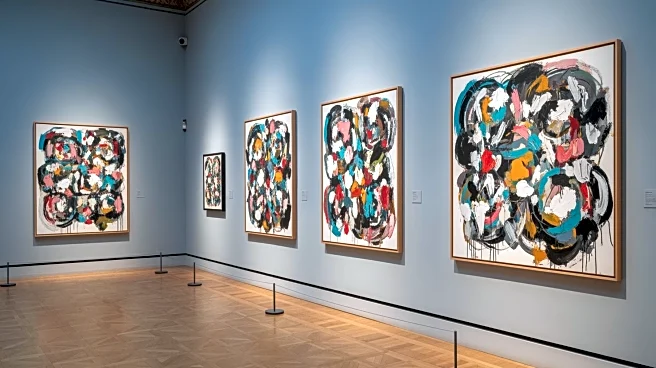What's Happening?
Marlene Dumas has made history as the first contemporary woman artist to have her works included in the Louvre's permanent collection. Nine paintings by the South African-born artist were unveiled at the Paris
museum, now displayed in the Porte des Lions atrium and the Galerie des Cinq Continents. The series, titled 'Liaisons,' features faces that reflect the 'horrors' of the modern world, with some being abstract and others more gestural. Dumas, in an interview, expressed that her art is influenced by the ongoing genocides and dehumanization in today's society. The Louvre's director, Laurence des Cars, stated that Dumas was an 'obvious choice' for the commission, highlighting her ability to bring together diverse sensibilities and origins through her work.
Why It's Important?
This inclusion marks a significant milestone for contemporary art and women artists, as the Louvre expands its collection to embrace modern narratives and diverse perspectives. Dumas' works challenge viewers to confront global issues and reflect on humanity's collective history. The decision to feature her art underscores the museum's commitment to evolving its collection to include contemporary voices, potentially influencing other institutions to follow suit. This move may inspire more recognition and opportunities for women artists in prestigious art spaces, contributing to a broader cultural shift towards inclusivity and representation in the art world.
What's Next?
The Louvre's expansion into contemporary art suggests a continued effort to diversify its collection. Future acquisitions may include more works from underrepresented artists, fostering a dialogue between historical and modern art. As the museum integrates contemporary pieces, it may attract a wider audience, encouraging public engagement with current global issues through art. The success of Dumas' exhibition could lead to further collaborations with contemporary artists, enhancing the museum's role as a platform for cultural exchange and innovation.
Beyond the Headlines
Dumas' inclusion in the Louvre's collection highlights the ethical responsibility of art institutions to address global issues through their exhibits. Her works serve as a reminder of the power of art to provoke thought and inspire change, challenging viewers to consider the impact of dehumanization and violence. This development may influence cultural institutions to prioritize art that reflects societal challenges, fostering a deeper understanding of the complexities of the human experience.









